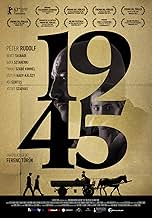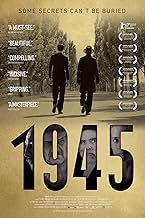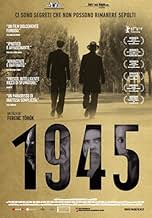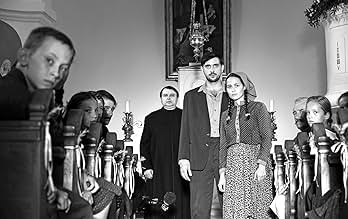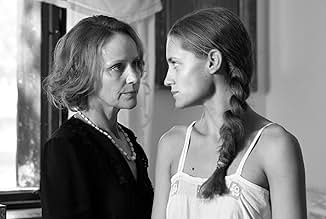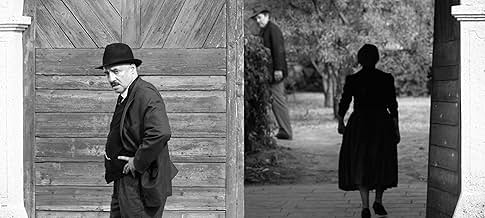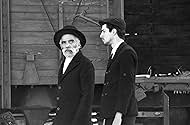IMDb RATING
7.1/10
4.4K
YOUR RATING
12 August 1945, 11 AM. Two mysterious strangers dressed in black appear at the railway station of a Hungarian village. Within a few hours, everything changes.12 August 1945, 11 AM. Two mysterious strangers dressed in black appear at the railway station of a Hungarian village. Within a few hours, everything changes.12 August 1945, 11 AM. Two mysterious strangers dressed in black appear at the railway station of a Hungarian village. Within a few hours, everything changes.
- Director
- Writers
- Stars
- Awards
- 7 wins & 5 nominations total
Angelus Iván
- Sámuel Hermann
- (as Iván Angelusz)
- Director
- Writers
- All cast & crew
- Production, box office & more at IMDbPro
Featured reviews
It reminds me "The Visit of Old Lady" by Friedrich Durrenmatt. it reminds the Old Greak tragedies. in special sense. in specific manner. two Jews in a Hungarian village. two hutches. a way. a wedding. memories about dark past. and everything becomes different.
for me, a masterpiece. for the clash between minimalism of the presence of the two strangers and the community storm. for the performances. and impecable craft of story. but, more important, for the status of near story. from the past of grandparents of Central Europe. for the force of cinema to give a sort of social exorcisation. for the art to give the realistic portrait of a world. for define the sin. and the choices behind the deep fears. a film about hidden demons. memories. papers. ambitions of actuary. answer of a husband. indifference of a priest. decision of a son. and the train. in the station of a village.
for me, a masterpiece. for the clash between minimalism of the presence of the two strangers and the community storm. for the performances. and impecable craft of story. but, more important, for the status of near story. from the past of grandparents of Central Europe. for the force of cinema to give a sort of social exorcisation. for the art to give the realistic portrait of a world. for define the sin. and the choices behind the deep fears. a film about hidden demons. memories. papers. ambitions of actuary. answer of a husband. indifference of a priest. decision of a son. and the train. in the station of a village.
During wars, people do hidious crimes. At WW2 many decent, next door people like you and me, took advantage of the anti-jewish pogrom and stole their property. But the war ended in 1945, and some of them manage to return and reclaim their properties... what happened then? The guilt of course, that's what happened. I think it's the only Hungarian film i have ever watched and if you come across it, don't pass it by. Its a film worth seeing.
Previous reviews have failed to take account of this film's "Sitz im Leben"-- the current situation in Hungary, where the Fidesz government under Orbán Viktor has played footsie with the broad swath of irredentist voters who continue to harbor anti-Semitic leanings. Hungary has not yet come to terms with its role in the murder of its Jewish citizens. For example, the recently erected monument to Victims of Nazi Aggression portrays Hungary as a Victim State, not as a willing cooperator in the execution of roughly 5% of the national population. But it was Hungarian officials that carried out the orders, not Germans. Hungarian officialdom and non-officialdom was more than willing to participate in the Holocaust, but they are loath to acknowledge any corporate responsibility.
A personal but illustrative anecdote. About seven years ago I was teaching at a gimnázium in a town not far from Budaptest and went to see the movie "Avatar" at a local theater over a weekend. The next Monday, as part of English conversation class, I told my students what I had done, that I had gone to thus and such theater to see the movie. The immediate response to my statement came from a student whom I had come to know as a pretty bright kid who was eager to learn. He said, "Oh yes, Jews own that theater."
Where the f*** did that come from? Over the past few years I have realized that it comes from the same deep-rooted inability of Hungarians to understand that their loss of territory after WWI and their continuing economic problems come not from their "enemies" (Jews above all, but Gypsies too) but from themselves and the same culture of self-deception and corruption that is depicted in this film.
Which film, by the way, is elegantly framed and carefully composed, is presented with almost stately precision, and which I highly, highly recommend.
A personal but illustrative anecdote. About seven years ago I was teaching at a gimnázium in a town not far from Budaptest and went to see the movie "Avatar" at a local theater over a weekend. The next Monday, as part of English conversation class, I told my students what I had done, that I had gone to thus and such theater to see the movie. The immediate response to my statement came from a student whom I had come to know as a pretty bright kid who was eager to learn. He said, "Oh yes, Jews own that theater."
Where the f*** did that come from? Over the past few years I have realized that it comes from the same deep-rooted inability of Hungarians to understand that their loss of territory after WWI and their continuing economic problems come not from their "enemies" (Jews above all, but Gypsies too) but from themselves and the same culture of self-deception and corruption that is depicted in this film.
Which film, by the way, is elegantly framed and carefully composed, is presented with almost stately precision, and which I highly, highly recommend.
An unflinching portrait of the power of conscience and the human effect of its avoidance. The post-modern narrative of identity politics and Nietzschean and victim culture here vaporizes into the dustbin of history. Human choices matter. Memory matters. Morality matters. Selfishness and structural, political complicity therewith lead to social disintegration. As C.S. Lewis wrote, revenge is the predictable arc of human affairs. There is only one thing that breaks the cycle of material human history and that is forgiveness.
Go. See. This. Film.
In the immediate aftermath of WWII, the arrival of two Jewish men turns a small Hungarian village upside down. The whole village profited from the deportation and extermination of their former Jewish neighbors, and now everyone fears exposure and ruin.
The petty vindictiveness and corruption of the villagers is their own undoing. All sorts of dire consequences ensue at the merest whiff that the villagers might be forced to take responsibility for their wartime misdeeds. This panic of the natives almost borders on slapstick; it stands in sharp contrast to the methodical, dignified simplicity of the outsiders whom the natives fear.
Great photography, great editing, great acting, great story. I highly recommend 1945.
The petty vindictiveness and corruption of the villagers is their own undoing. All sorts of dire consequences ensue at the merest whiff that the villagers might be forced to take responsibility for their wartime misdeeds. This panic of the natives almost borders on slapstick; it stands in sharp contrast to the methodical, dignified simplicity of the outsiders whom the natives fear.
Great photography, great editing, great acting, great story. I highly recommend 1945.
Did you know
- TriviaFor the role, Péter Rudolf gained 33 pounds (15 kg)
- How long is 1945?Powered by Alexa
Details
- Release date
- Country of origin
- Official site
- Languages
- Also known as
- 1945
- Filming locations
- Kalocsa, Hungary(location)
- Production company
- See more company credits at IMDbPro
Box office
- Budget
- €1,467,000 (estimated)
- Gross US & Canada
- $1,006,193
- Opening weekend US & Canada
- $20,365
- Nov 5, 2017
- Gross worldwide
- $1,240,738
- Runtime
- 1h 31m(91 min)
- Color
Contribute to this page
Suggest an edit or add missing content


